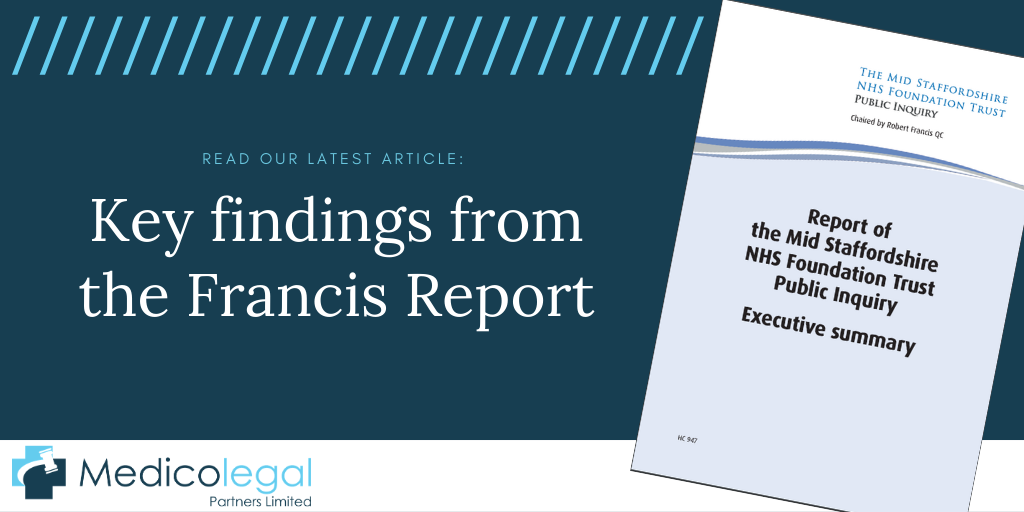
This is the first in a series of four articles on The Francis Report and its impact. We will be exploring the background to the report, analysing the duty of candour and barriers to its use, and discussing The Francis Report’s impact on medical practice. This article introduces the context that led to the publication of The Francis Report and highlights the report’s key findings.
The Francis Report was published on 6th February 2013, as a result of a public inquiry into failings at the Mid Staffordshire Foundation NHS Trust, which occurred between January 2005 and March 2009. Two previous inquiries uncovered a lack of basic care in many wards and departments, including leaving patients in soiled clothing and bedclothes, not providing assistance with feeding and drinking and staff treating patients and relatives with indifference. This situation appears to have arisen because the Trust was too focussed on meeting financial targets and satisfying the requirements needed to attain Foundation Trust status, and not on caring for its patients.
The main aim of the report was to determine why the problems at the Trust were not highlighted and acted upon, and what can be done to prevent a repeat of these events in the future. The report’s main focus is secondary care, but some of the findings also relate to primary and general care, and while the report concentrated on events at one hospital, it highlighted systematic failures within the entire health service. It suggested that there needs to be a fundamental change in culture, so that the welfare of patients is always the first concern, and also made a total of 290 recommendations, covering many aspects of patient care and safety. The most important of these, particularly in terms of medicolegal issues, are summarised below.
The most significant proposal of the Francis Report is the introduction of a statutory ‘Duty of Candour’. In order to achieve this, three characteristics are needed:
- Openness: in order to enable concerns to be raised and disclosed freely without fear, and for questions to be answered;
- Transparency: which will allow accurate information concerning performance and outcomes to be shared;
- Candour: so that if a patient is harmed by a health provider, they are informed of that fact and an appropriate remedy offered, regardless of whether an official complaint has been made or a question raised.
The duty of candour places a legal obligation on health service providers and organisations to be honest, open and truthful in all their dealings with patients and relatives, especially when mistakes occur. In addition, healthcare organisations must make truthful statements to regulators and the public, and must not mislead by omitting relevant facts. However, the provision of information in order to comply with this requirement should not be regarded as evidence or an admission of liability. If an individual or organisation is non-compliant, the patient should be able to seek resolution. To further aid the culture of openness, the report also recommended that gagging and non-disparagement clauses in contracts, which limit the legitimate disclosure of issues of patient safety and care that may be in the public interest, should be banned.
Although the handling of complaints should be consistent, any system should not be applied in a formulaic or insensitive manner. It should also be easy for patients to make a complaint through various different gateways. Any expression of concern by a patient should be treated as a complaint, unless the patient expressly refuses permission for this. Lessons learned from complaints must be effectively identified, disseminated and implemented. Furthermore, all complaints received should be published on hospital websites, along with the trust’s response, so that they can easily be viewed by interested parties.
It was also proposed that fundamental standards should be introduced and that criminal liability should be apportioned in the event that a breach of these standards leads to serious harm or the death of a patient, unless the provider or individual concerned can demonstrate that it was not reasonably practicable to avoid such a breach. There should also be more powers to suspend or prosecute boards or individuals if standards of care are not maintained. In order to assist in the creation of a caring culture within the NHS, all healthcare providers should be prepared to learn lessons from others and to allow their own practices to be scrutinised by their peers. This will be particularly relevant where there are concerns about a practitioner’s performance and it will also be essential in changing behaviour throughout the health service.
Finally, it was recommended that the role of GPs should be broadened to include an aspect of monitoring on behalf of any of their patients who receive acute hospital or other specialist services, so that their responsibility to their patients does not end on referral to hospital. This will necessitate checking on the patient after hospital treatment and assessing whether the outcome was satisfactory. An internal system should be put in place to enable GPs to flag any areas of concern.
The overarching theme of the Francis Report is that the NHS and all of its staff must adopt a shared culture in which the patient is always the priority. Central to achieving this is a system that encourages transparency, honesty and candour based on freely available reliable information on the attainment of standards. In this way, a situation similar to the Mid-Staffordshire crisis should be prevented from ever happening again.
About Medicolegal Partners
Medicolegal Partners has a team of experienced expert witnesses with a variety of medical specialisms, including pain, intensive care and anaesthesia, orthopaedic trauma, spinal surgery and dentistry. We are instructed to provide reports on cases for the defendant and claimant in clinical negligence and personal injury cases. Find out more about our experts.
Further reading:
Francis R. (2013). Report of the Mid Staffordshire NHS Foundation Trust Public Inquiry. London: The Stationery Office.
READ THE SECOND IN THE SERIES: ACHIEVING THE DUTY OF CANDOUR
